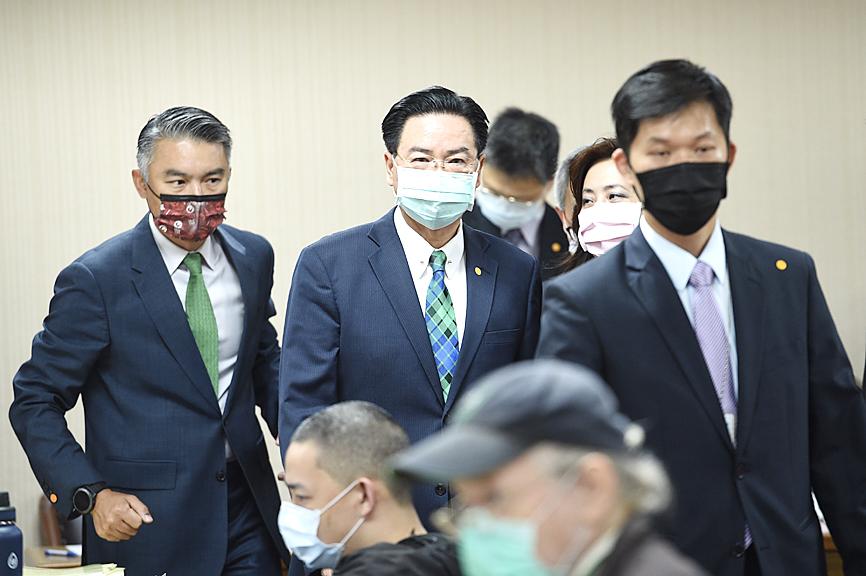The nation is to ship 150 oxygen machines to India this weekend, the Ministry of Foreign Affairs said yesterday, while confirming that talks are underway to conduct clinical trials of a domestically developed COVID-19 vaccine in Paraguay.
The ministry has since last weekend been looking for ways to help India, Minister of Foreign Affairs Joseph Wu (吳釗燮) told reporters in Taipei before heading into a meeting of the Legislative Yuan’s Foreign Affairs and National Defense Committee to report on Taiwan-Japan relations.
India has in the past few weeks struggled to contain a massive surge in daily COVID-19 cases numbering in the hundreds of thousands, with hospitals sending out urgent requests for oxygen and other equipment.

Photo: Peter Lo, Taipei Times
The government has been able to procure 150 oxygenators that have been modified for India’s voltage, which are to ship this weekend, Wu said.
It is looking to purchase more machines, as well as raw materials so that domestic manufacturers can continue production, he added.
Deputy Minister of Foreign Affairs Miguel Tsao (曹立傑) on Wednesday told lawmakers that the oxygen machines and other aid would be sent to India on China Airlines (華航) cargo flights.
This would not be the only shipment, he said, adding that the ministry would continue to provide aid on a long-term basis.
Meanwhile, ministry spokeswoman Joanne Ou (歐江安) in a statement on Wednesday confirmed media reports that Taiwan and Paraguay are in talks to conduct clinical trials for a domestically developed vaccine in the South American nation.
Paraguay is one of Taiwan’s 15 diplomatic allies and the remaining one in South America.
While receiving a shipment of Covaxin vaccines from India on Sunday, Paraguayan Expanded Program on Immunization Director Hector Castro extended special thanks to Taiwan for including Paraguay in the trials.
“Participating in clinical trials means not only contributing to science, but also guaranteeing vaccines for our country,” he said, inadvertently revealing that discussions had already begun.
Medigen Vaccine Biologics Corp (高端疫苗) and Paraguay’s National University of Asuncion School of Medical Sciences on Thursday last week held a videoconference to discuss vaccine cooperation, Ou said.
Both sides expressed a “high degree of willingness” to cooperate on conducting clinical trials in Paraguay, she added.
Medigen late last month started phase 2 clinical trials in Taiwan, administering 3,752 doses to participants.
As soon as trials enter phase 3 and it is authorized for emergency use, the nation would be happy to export the vaccine “under the principle of meeting domestic demand first,” she said.
“The government will continue to help Paraguay fight the pandemic and ensure the health and lives of Paraguayans are not used as diplomatic blackmail by the Chinese government,” she added, referring to reports that Beijing offered millions of vaccine doses in return for severing diplomatic relations with Taiwan.
The Paraguayan Ministry of Foreign Affairs last month said that some COVID-19 vaccine suppliers, whose legitimacy or link with the Chinese government has not been proven, had suggested breaking relations with Taiwan as a requirement for purchasing vaccines from China.

SECURITY: As China is ‘reshaping’ Hong Kong’s population, Taiwan must raise the eligibility threshold for applications from Hong Kongers, Chiu Chui-cheng said When Hong Kong and Macau citizens apply for residency in Taiwan, it would be under a new category that includes a “national security observation period,” Mainland Affairs Council (MAC) Minister Chiu Chui-cheng (邱垂正) said yesterday. President William Lai (賴清德) on March 13 announced 17 strategies to counter China’s aggression toward Taiwan, including incorporating national security considerations into the review process for residency applications from Hong Kong and Macau citizens. The situation in Hong Kong is constantly changing, Chiu said to media yesterday on the sidelines of the Taipei Technology Run hosted by the Taipei Neihu Technology Park Development Association. With

CARROT AND STICK: While unrelenting in its military threats, China attracted nearly 40,000 Taiwanese to over 400 business events last year Nearly 40,000 Taiwanese last year joined industry events in China, such as conferences and trade fairs, supported by the Chinese government, a study showed yesterday, as Beijing ramps up a charm offensive toward Taipei alongside military pressure. China has long taken a carrot-and-stick approach to Taiwan, threatening it with the prospect of military action while reaching out to those it believes are amenable to Beijing’s point of view. Taiwanese security officials are wary of what they see as Beijing’s influence campaigns to sway public opinion after Taipei and Beijing gradually resumed travel links halted by the COVID-19 pandemic, but the scale of

A US Marine Corps regiment equipped with Naval Strike Missiles (NSM) is set to participate in the upcoming Balikatan 25 exercise in the Luzon Strait, marking the system’s first-ever deployment in the Philippines. US and Philippine officials have separately confirmed that the Navy Marine Expeditionary Ship Interdiction System (NMESIS) — the mobile launch platform for the Naval Strike Missile — would take part in the joint exercise. The missiles are being deployed to “a strategic first island chain chokepoint” in the waters between Taiwan proper and the Philippines, US-based Naval News reported. “The Luzon Strait and Bashi Channel represent a critical access

Pope Francis is be laid to rest on Saturday after lying in state for three days in St Peter’s Basilica, where the faithful are expected to flock to pay their respects to history’s first Latin American pontiff. The cardinals met yesterday in the Vatican’s synod hall to chart the next steps before a conclave begins to choose Francis’ successor, as condolences poured in from around the world. According to current norms, the conclave must begin between May 5 and 10. The cardinals set the funeral for Saturday at 10am in St Peter’s Square, to be celebrated by the dean of the College